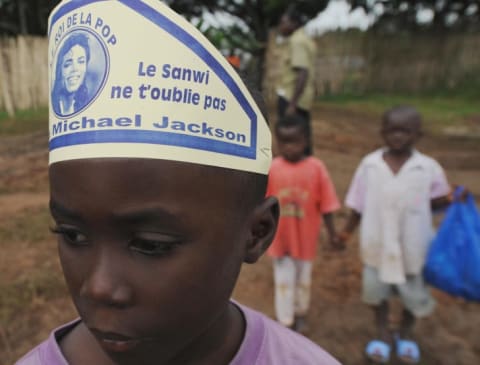When King of Pop Michael Jackson Was Officially Crowned King of a Small African Nation

As Michael Jackson's private plane landed in Abidjan, a populous city in Côte d’Ivoire (Ivory Coast), thousands of people were waiting near the tarmac, hoping to meet the superstar. But Jackson's visit that day, February 13, 1992, got off to a rocky start.
Rather than greet the crowd of government officials, journalists, and fans, Jackson held his nose as he stepped off the plane and reportedly sprinted toward a waiting limo. Although his team later claimed that the gesture was a nervous twitch, fans were disappointed that Jackson seemed to snub them. Even worse, police used batons and tear gas to attack a crowd of fans who were waiting for Jackson outside his hotel. Already-heightened tensions between police and student protestors in Abidjan may have contributed to the violence, but some media reports blamed the presence of the musician and his larger-than-life image.
Despite these setbacks, Jackson had always felt a deep connection to Africa. In a May 1992 interview with Ebony magazine, he explained how he fell in love with the continent on a trip to Senegal with the Jackson Five when he was a teenager: "Drums and sounds filled the air with rhythm. I was going crazy … This is it. This is where I come from. The origin."
Among the many stops on this February 1992 trip, Jackson's itinerary included meeting with Tanzania's president to talk about saving African elephants, receiving a medal from the president of Gabon, and visiting orphanages, hospitals, and churches. But for the biggest honor, Jackson traveled to Krindjabo, a village in the southeastern corner of Ivory Coast. There, the King of Pop became Michael Jackson Amalaman Anoh, an actual king.
In Krindjabo, the Agni people have lived in the Kingdom of Sanwi, an African region, since the mid-18th century. Based on mystic readings and possible DNA tests, a tribal chief asserted that Jackson was a descendent of Sanwi royalty and, accordingly, invited him to be crowned king-in-waiting (akin to a prince in the West).
According to NPR's Africa correspondent Ofeibea Quist-Arcton, Jackson's coronation was full of joy, dancing, and the frenetic sounds of traditional Agni drumming. Jackson put on a colorful, traditional toga-style cloth and sat on a golden stool under a sacred tree. Agni chiefs and elders took turns crowning him and chanting, and villagers drummed and topless women danced to celebrate Jackson's coronation as Chief of the Agni and King of the Sanwi.
After he was crowned, Jackson gave his thanks in French and English, then he signed documents to make his coronation official.
But Jackson's ties to the Kingdom of Sanwi didn't end there. As Sanwi beliefs dictate, when Jackson was crowned he became the spiritual son of King Nana Amon Ndoufou IV, a Sanwi leader who participated in Jackson's coronation. In 1995, Jackson invited Ndoufou to his home in Los Angeles, and for four days, Jackson and his then-wife Lisa Marie Presley hosted Ndoufou. On his trip, Ndoufou also met attorney Johnnie Cochran, and Jackson took him to Universal Studios.

Jackson's unexpected death in 2009 spurred the Sanwi Kingdom to hold a two-day royal funeral for their king. Dancers, Jackson lookalikes, and more than 1000 villagers gathered to mourn. Tribe members asked Jackson's family for his body, hoping they could give him a royal burial, but Jackson was ultimately interred in Southern California. Sanwi chiefs eventually found a successor for Jackson's crown—minister and politician Jesse Jackson.
Asked how it felt to be a real king—a title perhaps even harder to obtain than his still-relevant King of Pop honorific—Jackson remained humble. "I never try to think hard about it because I don't want it to go to my head," he told Ebony. "But, it's a great honor."